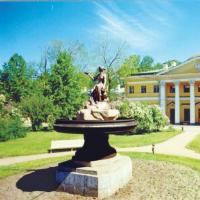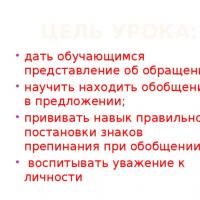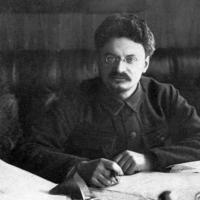Presentation on the topic of what humanity is. Presentation for the social studies lesson "Man and Humanity." Man is a biosocial being
To use presentation previews, create a Google account and log in to it: https://accounts.google.com
Slide captions:
Item of the plan Item of the plan Item of the plan Item of the plan Item of the plan 3
1. What is humanism. 2. Show attention to the elderly.
Plan point 1 Plan point 2 Plan point 3 Plan point 4 Plan point 5 ◊ 1. Read § 12. ◊ 2. Answer the questions in the “Let’s test ourselves” section. ◊ 3. Assignments in the “In the classroom and at home” section - orally.
Item of the plan Item of the plan Item of the plan 4 Item of the plan 5 “Humanity - humanity, human attitude towards others.” Dictionary D. N. Ushakova
Plan point Plan point Plan point 4 Plan point 5 “Humanity is a system of moral and social attitudes that presupposes the need to show sympathy for people, provide assistance, and not cause suffering.”
Plan point 3 Plan point 4 Plan point 5 Humanism (from the Latin humanitas - “humanity”, humanus - “humane”, homo - “man”) is a worldview in the center of which is the idea of man as the highest value.
Item of the plan Item of the plan Item of the plan 4 Item of the plan 5 Humanism is a system of views of advanced thinkers of the Renaissance, who were characterized by interest in man, faith in his capabilities and talents. From the point of view of humanistic philosophers, man is the center of the Universe, the best creation of God.
Item of the plan Item of the plan Item of the plan 4 Item of the plan 5 V.V. Veresaev Read the material in paragraph No. 12, p. 101, para. 3-5 and answer the questions: “1. What is a parable? 2. What idea did V.V. Veresaev want to convey to us in his work?”
Item of the plan Item of the plan Item of the plan 4 Item of the plan 5 a system of views that recognizes the value of a person, his life, freedom and rights; the principle of behavior that a person follows in his activities
Plan point 2 Plan point 3 Plan point 4 Plan point 5 “Let your mind be kind and your heart be smart.” S. Marshak
Item of the plan Item of the plan Item of the plan 4 Item of the plan 5 What periods is human life divided into?
Plan point 2 Plan point 3 Plan point 4 Plan point 5 Read the material in paragraph No. 12, pp. 101-102 and answer the question: How do you understand the words of K.I. Chukovsky: “Being with the young is our joyful duty”? Korney Ivanovich Chukovsky
Plan point 2 Plan point 3 Plan point 4 Plan point 5 1. How do you help your elderly relatives? 2. What are you talking to them about? 3. What did you learn and what did you learn from them? 4. What experience would you like to learn?
source of the template Natalia Vladimirovna Chernakova Teacher of chemistry and biology, State Educational Institution NPO Arkhangelsk Region “Vocational School No. 31” “http://pedsovet.su/”
Slide captions:
It is always in the power of all people to do good and evil. But evil is done without difficulty, It is more difficult to do good.
What is a person? How does a person differ from other living beings? And how does a person relate to what surrounds him?
Human qualitiesPositiveNegative
Origin of the concept of “humanism”Is it easy to be humaneHumane society
Humanism
(from the Latin homo - man) - philanthropy, respect for man
Erasmus of Rotterdam
Thomas More
Francois Rabelais
William Shakespeare
Rafael Santi
Leonardo da Vinci
V. Dahl, D. London, Schweitzer, Carneil, Solzhenitsyn, Dostoevsky, Pascal, Gorky, Ozhegov, Kohn
a person's responsibility for his deeds and actions
It’s not at all easy to be kind, Kindness doesn’t depend on height, Kindness doesn’t depend on color, Kindness is not a gingerbread, not a candy. You just have to, you have to be kind and don’t forget each other in trouble.
this is a fair society, in which the main thing is the person and his good
What is “humanism”? What does it mean to be a humane person? What kind of society is called humane?
A humane society is a fair society in which the main thing is the person and his good. True humanism is a person’s responsibility for his deeds and actions
Manage to overcome obstacles, pain, and illusory success. Live without demanding rewards for your actions for the sake of everyone. The world still has a cold with sadness, Trouble strikes on the sly, Someone must need you - Always - like bread or water...
tolerance (French) - an attitude in which it is accepted that others may think or act differently than oneself; tolerance (English) - willingness to be tolerant, condescension; tolerance (Russian) - the ability to tolerate something or someone, to be self-possessed, hardy, persistent, able to put up with the existence of something, someone, take into account the opinions of others, be forgiving.
What is tolerance?
Tolerance is friendship.
Tolerance is mercy.
Tolerance is compassion.
Tolerance is respect.
Tolerance is the kindness of the soul.
Tolerance is patience.
Cooperation
Forgiveness
Flower of tolerance
"Tell me a good word"
On the topic: methodological developments, presentations and notes
Presentation for the lesson “What is time” (speech development, grade 6)
Lesson within the framework of the RKMChP technology. The material is focused on the development of students' communicative competence and creative abilities....
Educational presentation for a speech development lesson in 5th grade “Such different letters”
The educational presentation “Such different letters” contains illustrative and textual material for variable use in speech and rhetoric development lessons in 5th grade. With this material you can...
With this lesson we complete the 6th grade Social Studies course. During the lesson we will talk about what humanism is, what values are humanistic. We will also consider the question of what kind of society can be considered humane, what is accepted in this society. Using specific historical examples, we will look at how you can use humanistic ideals in your life.
Topic: Virtues
Word "humanism" contains the root homo, which means “man” in Latin. This word is not of Russian origin, but at the same time, you and I understand perfectly well that if we are talking about humanity, This means that we assume a certain set of feelings, qualities and reactions of a person to a particular situation. You are humane when you treat this situation from the point of view of goodness, justice and do not succumb to opposite feelings. A humane person does not try to offend someone or infringe on his own or someone else’s human dignity, because if the situation turns out to be such that you offended someone, then you acted inhumanely.
Thus, humanism is a worldview centered on the idea of man as the highest value. Humanism affirms the value of man as an individual, his right to freedom, happiness, development, and manifestation of his abilities. Everything that guarantees our freedom, our rights, can be considered humane or humanistic. It is clear that in this case it is difficult to give a clear and rigid definition, because human values are constantly changing. What was normal and accepted 200-300 years ago may now be an anachronism, which can sometimes interfere with a person and be inhumane. But if some values correspond to a person’s current views on the world, if these values help human life, help preserve social organization and an individual approach to each person, then, of course, these are humanistic values.

Humanism is somewhat similar to the concepts of morality and ethics; they are partially combined with each other, because the golden rule of morality meets the standards of a humane society. Humane Society is a society that values human personality. This is a society that cares about those people who need help, and cares sincerely, and not as a handout. Help in our society is needed primarily by older people, since they have lived most of their lives and are physically and mentally tired. Such people need care and attention from others. If you smile at older people, if you treat them with care and understanding, and help them with basic things, you are simply prolonging their lives. You make them healthier, including physically. This is a humane attitude towards people.

Rice. 3. Elderly people need our care ()
People with poor health also need our help, and sometimes our humane attitude can manifest itself in not treating people with disabilities as disabled people. In general, the word “disabled” has a negative connotation and can greatly hurt others, as if we are declaring in this way that this person is defective. Most people with disabilities fight against the public perception that they are disabled. They can also live, albeit partially, a normal human life, and this is what we need to concentrate on.
Humanism, of course, did not appear now; it is not an invention of the 20th or 21st centuries. People have been thinking about the nature of humanity, the human relationship to oneself and others for a long time. Many philosophers and scientists created their own advice and concepts of how a person should behave. The great Russian writer Lev Nikolaevich Tolstoy put forward the whole concept of non-resistance to evil through violence. This is a kind of symbol of humanism, because if a person does not respond to evil with evil, then perhaps the next manifestation of evil simply will not happen. It is impossible to endlessly offend a person who does not resist you, who does not want to harm you. Such apparent weakness is actually an outstanding strength, the strength of a person.

Of course, you may argue that this cannot be true. After all, if I am beaten, offended, insulted, I must defend myself, and not silently endure the violence. After all, it is a biblical truth: an eye for an eye, a tooth for a tooth. But this does not always turn out to be the absolute truth. To convince you, it is enough to cite the example of a person like Mahatma Gandhi. This is the leader of the movement of non-cooperation with the British colonial troops and the British administration in India. Mahatma Gandhi was able, without any armed uprising, without blood and carnage, to essentially push the British out of India. After this, India became a sovereign state. He was the greatest humanist of the 20th century, who with his life proved that non-resistance to evil through violence works.

It is also impossible not to mention in our conversation the name of such a great English humanist as Thomas More. In 1515-1516, Thomas More wrote his most famous work, Utopia. Over time, the word “utopia” itself became a common noun and turned into a designation for something beautiful, but completely unreal. Thomas More truly described an ideal, unique state in which all citizens were free. The inhabitants of Utopia chose their own rulers and officials. There were no taxes, there was no money and private property, there was not even hard physical labor. All citizens of Utopia worked only a few hours a day, and then enjoyed the study of sciences and arts. More did not just preach humanism, he really was a highly humane moral person, ready to defend his convictions to the end.

Humanism is the greatest concept. Our human attitude towards each other is an inevitable consequence of the development of civilization. If we want to remain human, we must become human. We must treat others the way we would like them to treat us.
Surely now you know the USA as a democratic country with a developed social system that fights for human rights. There is a place for independent public opinion in this country. Currently, the President of the United States is African-American Barack Obama.
But just 60 years ago, the United States of America was completely different. Yes, the same Constitution of 1787 was in force in the United States, which guaranteed the rights and freedoms of Americans. But at the same time, in the United States there was such a phenomenon as segregation, or racial division. In the middle of the 19th century after Civil War In the USA, slavery was abolished, and Americans were very proud that they themselves were able to overcome such a shameful relic of the past. But they did not get rid of the fact that the attitude of white people towards African Americans was derogatory. White people—the Yankees—were the backbone of American society; all those who were people of a different skin color, especially African Americans, found themselves left out of public life. There were special black neighborhoods for them. African Americans were not allowed to enter bars or any public establishments for white people, even public transportation that carried whites. Under no circumstances could blacks study in those educational institutions where white children and youth studied. Negroes were practically denied access to higher education institutions.

It is clear that democracy could not exist within such a society; this is absurd. If one part of the state's population is in fact oppressed, there can be no talk of democracy. At this time, an absolutely amazing person appeared in the United States, a humanist, who also proved with his life that one cannot resist evil with violence, but must fight evil according to human principles. This man's name was Dr. Martin Luther King. King was a Baptist minister, a very popular religious sect in the United States, especially among African Americans. First of all, this man was a public figure. He fought to ensure that the rights of African Americans were equal to the rights of the white population. The most famous is the famous speech of Martin Luther King, which he read to a huge audience (about 300 thousand Americans were listening to him at that moment). This speech was called “I have a dream”, Martin Luther King said that people should live in peace and harmony. People should resolve all their conflicts with words, not physical force. But the most important thing that King dreamed of was the absence of differences between Americans by skin color, eye shape, language and other racial and national characteristics.

Dr. Martin Luther King received Nobel Prize world in 1964. The world appreciated so highly the activities of a man who tried to change a country that was not the most favorable for life at that time. King was eventually assassinated in 1968, shot by one of the people who were ardent fans of segregation. But his death was not in vain; it was a symbol of the end of segregation. Indeed, the United States soon got rid of this shameful social system. Now in America it is a shame to call a man a black man. It's considered an insult; the polite term is "African-American." All people, regardless of skin color, are equal, and this is the highest essence of humanism.
1. Vinogradova N.F., Gorodetskaya N.I., Ivanova L.F. and others / Ed. Bogolyubova L.N., Ivanova L.F. Social studies 6th grade. - Enlightenment, 2004.
2. Kravchenko A.I., Pevtsova E.A., Social studies: Textbook for 6th grade of educational institutions. - 12th ed. - M.: LLC "TID" Russian word- RS", 2009. - 184 p.
3. Barabanov V.V., Nasonova I.P. / Ed. Bordovsky G.A. Social studies 6th grade, 2007.
4. Nikitin A.F., Nikitina T.I. Social science. 6th grade. - Bustard, 2013.
1. Russian Humanistic Society ().
2. Morality and society. Social ethics ().
3. Racial segregation in America. The story of one victory ().
1. Complete the task “Test yourself” on page 212. Textbook: Vinogradova N.F., Gorodetskaya N.I., Ivanova L.F. and others / Ed. Bogolyubova L.N., Ivanova L.F. Social studies 6th grade. - Enlightenment, 2004.
2. How do you understand the expression “humane society”? What principles does it follow?
3.* Surely you have met humane and admirable people in your life. Write an essay on the topic “My Hero.”
Goals and objectives: introduce students to the concepts of humanism, principle and humanity; explore their essence; identify factors that contribute to increasing humanity and humanism; discuss the problem of the need to help older people.
Planned results: students must characterize a humane person; compare social objects, figuring them out common features and differences; master the principle of working with a textbook, the text of which contains diagrams, additional text and questions, as well as conduct a discussion, heuristic conversation, work with documents, analyze problems and solve problem problems, work in a group.
Formed UUD:
Subject: explain the essence of humanism; apply basic moral concepts, norms and rules, analyze real social situations with their help; understand their role as decisive regulators of social life;
Metasubject:
Communicative: express thoughts accurately and competently, defend your point of view during the discussion;
Regulatory: formulate targets educational activities, build an algorithm of actions;
Cognitive: carry out advanced information search; analyze, compare, classify and generalize facts and phenomena; give definitions of concepts;
Personal: formation of competence in solving moral problems based on personal choice, moral feelings and moral behavior, a conscious and responsible attitude towards one’s actions.
Equipment: textbook, diagrams for the lesson, package with working material, presentation, projector.
Lesson type: discovery of new knowledge.
During the classes:
Organizing time.
Hello!
Students take turns touching their neighbor’s fingers of the same name, starting with their thumbs, and say:
I wish (big)
Success (index)
Large (medium)
In everything (nameless)
And everywhere (little fingers)
Hello! (whole palm)
II. Motivational-target stage
Listen to the parable and answer the questions.
A man was walking along the shore and suddenly saw a boy picking up something from the sand and throwing it into the sea. The man came closer and saw that the boy was picking up starfish from the sand. They surrounded him on all sides, the coast was literally strewn with them for many kilometers.
Why are you throwing these starfish into the water? - the man asked, coming closer.
If they stay on the shore until tomorrow morning, when the tide begins to go out, they will die,” the boy answered, without stopping his work.
But that's just stupid! - the man shouted.
Look around! There are millions of starfish here, the shore is simply strewn with them. Your attempts will not change anything!
The boy picked up the next starfish, thought for a moment, threw it into the sea and said:
No, my attempts will change a lot... for this star.
What is this parable about?
Answer the questions given in the “Remember” section on page 100 of the textbook.
Think about what we should talk about today and what questions should we answer?
Lesson topic: Man and humanity.
Lesson plan:
What is humanism.
Show attention to the elderly.
III.Introduction to new material.
Today's lesson is about man. Among the secrets that a person learns, the most incomprehensible is himself. The eternal question: what is a person? What does it mean to be human? How to become humane?
Let's try to answer these questions.
1. What is humanism.
What associations do you have when you hear the word “humanity”? (We write down the students’ answers on the board.)
Read the text on page 100 of the textbook, paragraph 1, working in groups, discuss and visualize the essence of a humane attitude towards people.
Humane treatment of people:
Generosity
Kind
Respectful
Willingness to understand
Treated as an equal
On page 100 of the textbook, find the definition of the concept “humanism” and draw up a diagram of its essence.
Humanism is a certain system of views that recognizes
- human value
- human rights to freedom
- human right to happiness
- the human right to develop and demonstrate one’s abilities
Humanism -
- The criterion for assessing a just society is the good of man
- Love for people
- Respect for people
- The principle of behavior presupposes a person’s responsibility for his actions
Physical exercise.
The origin of the concept of “humanism” dates back to the Renaissance. (early 14th - end of 16th centuries). The revival was characterized by interest in man, faith in his abilities and capabilities. The first humanists were Thomas More, Francois Rabelais, William Shakespeare, Miguel Cervantes, Leonardo da Vinci, Raphael Santi.
Read the statements of great people about humanism and comment on them. Which one do you think is the most correct?
Working material:
If a person is firm, decisive, simple and quiet, then he is already close to humanity (Confucius)
There are many people, but few people (Diogenes)
It's easy to be a saint when you don't want to be human (K. Marx)
Be human first and foremost. Don’t be afraid to burden yourself too much with humanity (V. Hugo)
In this world, anyone who lightens the burden of another person benefits. (C. Dickens)
Political duties can change, man's duties to man never do. (J. Renan)
If you are indifferent to the suffering of others, you do not deserve to be called a human being.
All people are worthy of respect and have good qualities. Although the good inherent in people is not always manifested freely and unhindered.
What do you think prevents people from always doing good deeds?
On page 101 of the textbook there is a parable by the writer V.V. Veresaev's "Legend", read and answer the question.
What is the meaning of this parable?
Read the section “Once upon a time there lived a man” on pages 101-102 for yourself. Answer the questions at the end of the section and justify your answer.
2. Show attention to the elderly
Since ancient times, people have been concerned about the attitude of young people towards the older generation. The Holy Scripture says: “Stand up for your father in his old age and do not grieve him,” “Honor your elders, be reverent”?
What do you think the word “reverence” means?
Reverence is a kind, respectful, polite, benevolent attitude towards elders.
At the beginning of the 18th century, by decree of Peter I, rules of conduct for “young youths” were issued. Listen to an excerpt from this document.
“An Honest Mirror of Youth, or Indications for Everyday Conduct”
First of all, children should support their father and mother in great honor. And when their parents tell them what to do, it happens that they always hold their hat in their hands, but don’t put it on in front of them, and don’t sit next to them, don’t look out the window in front of them, but everything is done in a secret way with great respect, not in line with them, but not much to stand behind them on the sidelines, like servants. Do not command anything in the house with your name.
Children do not have the right to scold or reproach anyone with bad words without orders from their parents; they must behave politely and courteously.
When parents speak, you should not interrupt their speeches; you should wait until they speak out. They must stand straight in front of their parents.
Don’t speak without asking, but when you speak, they should respond or answer as soon as they hear the voice of their parents and not answer boldly.
How do you understand these rules and which of them are needed today?
Which of these rules do you follow?
What is meant by the concept of “venerable age”.
Valentina Oseeva’s story “Just an Old Lady” describes a situation - a boy and a girl saw that the old lady walking in front slipped and fell.
Hold my books! - the boy shouted, handed his bag to the girl and rushed to help the old woman.
When he returned, the girl asked:
Is this your grandmother?
No, the boy answered.
Mother? - the girlfriend was surprised.
Well, aunt? Or a friend?
No! No! - the boy said smiling. - It's just an old lady!
What is this story about? What did this incident teach you?
V. Reflection.
There is a self-assessment sheet on the desks. Place the person on the level that best suits your condition.
VI. Summarizing.
Let's test ourselves by completing several tasks.
Homework:
Assignments to choose from: creative essay: Assignment 2 or 3 of the “In the classroom and at home” section on page 104 of the textbook.
Teacher: At the end of the lesson, listen to Natalya Davydova’s poem “Grandma stood on the side.”
Remember: we must take care of those who need it.
Bibliography:
1. L.N. Bogolyubov Lesson developments, Moscow, Education. 2016
2. Textbook, ed. L.N. Bogolyubova Social studies, 6th grade. M.: Education, 2015.
 All types of RNA. Structure and functions of RNA. Types and types of RNA cells
All types of RNA. Structure and functions of RNA. Types and types of RNA cells In which word is the letter denoting the stressed vowel sound correctly highlighted?
In which word is the letter denoting the stressed vowel sound correctly highlighted? Military Medical Academy named after
Military Medical Academy named after Presentation on the topic "appeal" Punctuation - spelling warm-up
Presentation on the topic "appeal" Punctuation - spelling warm-up “Indecent peace”: how the Treaty of Brest-Litovsk influenced the course of Russian history
“Indecent peace”: how the Treaty of Brest-Litovsk influenced the course of Russian history Political reforms of Peter I
Political reforms of Peter I Photos of military orders and medals of the USSR during the Great Patriotic War
Photos of military orders and medals of the USSR during the Great Patriotic War